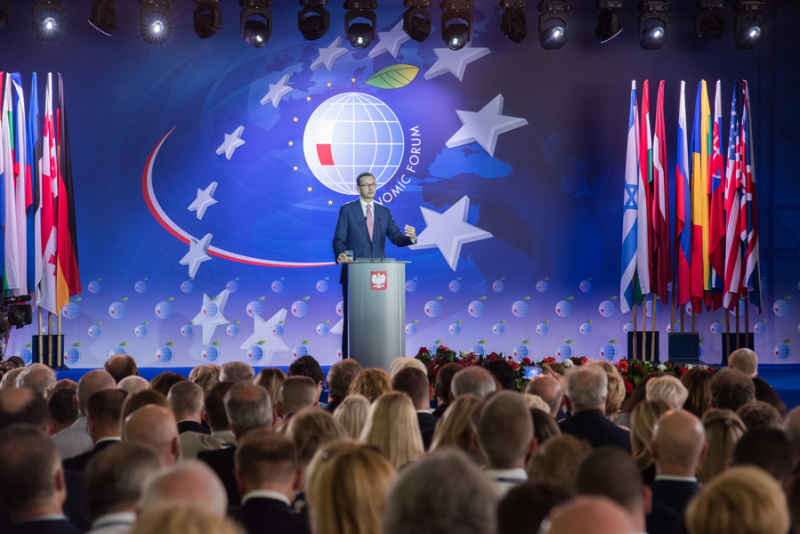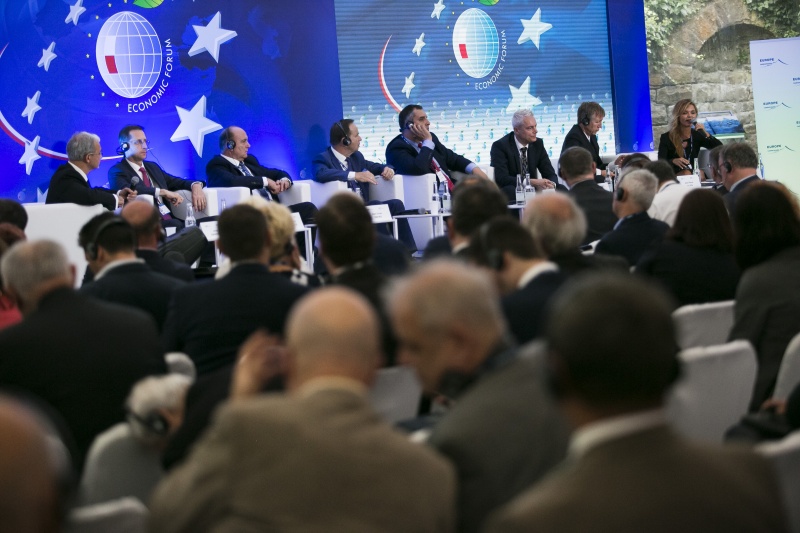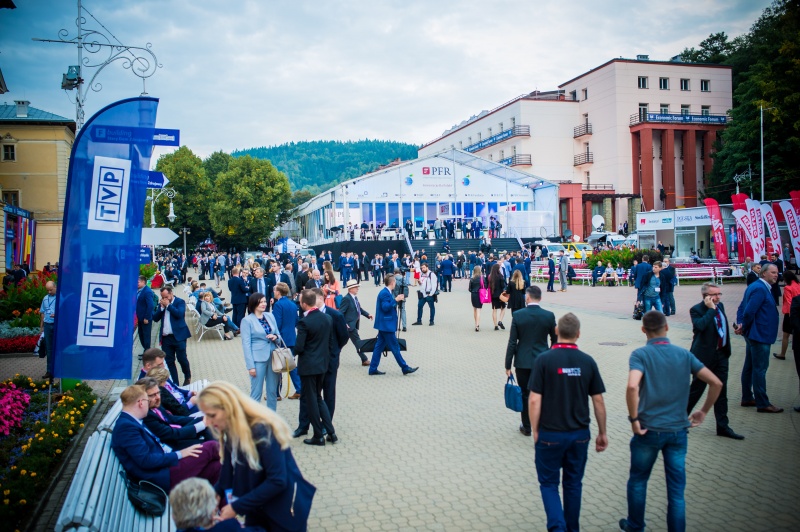
From morning to late evening, the sound of ringing phones and the hum of conversations is louder than usual. The headquarters of the Foundation Institute for Eastern Studies at Warsaw’s Powiśle is busy with the final preparations of the 29th edition of the Economic Forum in Krynica. On 3-5 September, this mountain resort in Beskid Sądecki will once again host the largest conference in this part of Europe. The organisers are preparing for the arrival of up to five thousand guests, of whom an estimated 40% will arrive from abroad. Poland will play host to numerous representatives of its neighbouring nations, such as Ukraine, the Czech Republic, Slovakia and Hungary. A sizeable delegation from the United Kingdom is expected, as well as guests from the Nordic countries, the Balkans and the Caucasus. Krynica will also welcome delegates from more distant parts of the world, such as India and Africa.
‘The Europe of Tomorrow. ‘Strong’ Meaning What?’
The title of this year’s Economic Forum is ‘The Europe of Tomorrow. ‘Strong’ Meaning What?’ This question is of particular importance in this day and age.
There exist various outlooks on the future of our continent, such as the perspective of a “two-speed Europe”, which has been applauded by some politicians of the “old” EU, and which the Polish government objects to. Is it still possible to reach a consensus on this matter? The weakening of the European structures is becoming increasingly noticeable – the United Kingdom is leaving the EU community on 31 October this year. Within Europe, the Eurosceptic parties are growing in power, and the American-Chinese trade war has become a reality. The German economy, the most powerful on the European continent, is slowing down. There are many crises, and it is vital to establish how they should be dealt with.
“Only a collective voice of Europe can demonstrate its strength. Divergences in fundamental issues give the countries with the greatest economic and military potential scope to push their own interests forward. Yet, European leaders are certainly capable of discussion, and this is perfectly illustrated by the issue of North Macedonia and Greece. The conflict surrounding the country’s name was finally solved after many years – explains the Chairman of the Economic Forum’s Programme Council, Zygmunt Berdychowski.
Krynica is a perfect location to host discussions and arrive at shared visions. Every year, the mountain resort is a meeting place for heads of state, government and parliament members from the region, as well as economists and local government representatives. There will be no shortage of representatives of the world of science and business, as well as the most prominent Polish and international media.
Krynica is people
The VIP list is long. Once again, the town expects the arrival of the Polish Prime Minister Mateusz Morawiecki, marshals of the Sejm and Senate as well as numerous ministers working for the Polish government. Jerzy Kwieciński, Jarosław Gowin, Piotr Gliński, Krzysztof Tchórzewski, Witold Bańka, Bożena Borys-Szopa, Dariusz Piontkowski and many others have already confirmed their participation in the forum. The delegation from the United Kingdom will also include important guests. Stephen Barclay, Secretary of State for Exiting the European Union, and Matt Warman, Digital Minister, have also announced their presence. The Economic Forum will also host some high-ranking representatives of Poland’s geopolitical circle, such as the President of Republika Srpska Željka Cvijanović, Minister of Foreign Affairs of Ukraine Pavlo Klimkin, and the Slovak Deputy Minister for Environment and Climate Change Norbert Kurilla.

This year’s programme includes five plenary sessions and more than 260 panel discussions, events and meetings. The newly introduced thematic tracks include the Cybersecurity Forum and the Environmental Protection Forum. In times of new methods of war, continuous cyber-attacks and attempts to destabilise the functioning of entire countries by hackers, the issue of cybersecurity is becoming a key concern. The speakers at the forum will include Sigurdur Emil Palsson, Chief National Cyber Security Adviser from Iceland, and a high-ranking official from the British National Cyber Security Centre (NCSC).
The year of 2019 marks two important anniversaries: the 70th anniversary of the signing of the North Atlantic Treaty and the 20th anniversary of Poland’s presence in NATO. Now is a perfect moment to discuss the future of Poland in the alliance and its role in the changing geopolitical situation around the world. This should be done in consideration of the effort made by the Polish government to establish a permanent base for American troops on the territory of the Republic of Poland. One of the speakers will be the former commander of American troops in Europe, Lt. Gen. Ben Hodges.
As during each edition of the Economic Forum, the “Man of the Year” award will be handed out based on the votes submitted by the Jury of the Programme Council of the Economic Forum. Last year, this title was awarded to the Prime Minister of Lithuania Saulius Skvernelis, while the previous years saw the award going to Victor Orbán, Jarosław Kaczyński, Lech Wałęsa and Donald Tusk, among others. Who will be recognised this year? The winner will be known at the start of September.
The Europe of challenges
For many years, one of the more important thematic tracks has been the topic of Carpathian Europe. Krynica provides a wonderful opportunity to discuss cooperation and the challenges facing this part of the continent. Many people are concerned about the future of the countries belonging to the Visegrád Group. In 1991, the main objective of the newly established organisation associating Poland, Hungary and the then Czechoslovakia was the granting of support in aspiring to the membership in NATO and the European Union. Ever since these ambitious goals have been achieved, the cooperation between these four countries has become weaker. The Czechs, Slovaks and Austrians have established the Slavkov Triangle, which seems to be a competitive entity to V4. Poland and Hungary, on the other hand, are stepping up their bilateral cooperation. If the Visegrád Group is really as important to its constituent countries as it is publicly declared, this will be reflected in meetings between the states of the Carpathian Europe. Therefore, this item on the agenda should be followed closely.

The programme covers the broad spectrum of all (or most) of the problems that the international community has so far failed to address. Consequently, a lot of time has been earmarked for discussions about the future of Ukraine. The continued war in Donbas and the recent presidential and parliamentary elections have changed the political structure of Poland’s eastern neighbours. Several hundred guests from Ukraine are expected to arrive in Krynica, including the First Deputy of the Head of the Administration of the President of Ukraine Serhiy Trofimov.
As every year, a large delegation from Hungary will also visit the mountain resort. The organisers expect a large group of about one hundred people. The most important guests include the Minister of Finance and Deputy Prime Minister Mihály Varga, the Minister of Foreign Affairs and Trade Péter Szijjártó, and the Deputy Speaker of the National Assembly of Hungary János Latorcai. The Forum will also be attended by Richard Horcsik, chairman of the Hungarian parliamentary committee for European affairs, and Richárd Végh, the CEO of the Budapest Stock Exchange.
The cultural programme of the 29th Economic Forum includes almost 30 events – exhibitions, concerts, author’s evenings and film screenings. The forum in Krynica will also have some Hungarian flavours. In cooperation with the Hungarian Cultural Institute and the Hungarian Embassy, the Kerekes Band, renowned for playing a mix of jazz and folk, will hold a concert during the event.
The Europe of Tomorrow. Strong, but how strong?
Modern Europe has come a long way since Schuman and Adenauer founded the European Coal and Steel Community in the 1950s. The ardent Catholic Schuman believed that the “value of Europe is a Europe of values”. The question is whether, looking at the “values” promoted by today’s European Union, he would be satisfied with them. The leaders of the EU, living in the “Brussels bubble”, do not seem to understand the problems of ordinary people. The questions whether the EU can still be reformed and whether it is open to such reforms remain unanswered. Brexit has shaken the European states to the core. The modern history of the EU has never before faced a crisis whose consequences are so difficult to predict. Just outside the EU’s eastern border, war continues to rage, while millions of immigrants are flowing across its western borders. The future of the continent must be debated, but concrete actions must also be taken. This is a good moment to hold the Economic Forum.
Should one visit the conference in Krynica? The answer is no, if you don’t like crowds. The answer is no, if you are not interested in politics and the impact it has on the world around you.
For anyone else, this is a great opportunity to make use of the experience of others, understand contrasting opinions, establish new contacts and meet people from the front pages of newspapers and those who have real power to change things. Krynica at the beginning of September is simply the place to be, and anyone who has ever attended the Economic Forum in the past can confirm it.
.
Tomasz F. Dzbeński
Tomasz F. Dzbeński, z wykształcenia prawnik (Wydział Prawa i Administracji UW), pasjonat historii konfliktów zbrojnych i strzelectwa sportowego. Przez kilkanaście lat mieszkał poza Polską, m. in. w Wielkiej Brytanii i RPA. Obecnie zawodowo związany z Instytutem Studiów Wschodnich, gdzie pracuje jako Coordinator for United Kingdom, Ireland and Commonwealth of Nations. Jego analizy dotyczące tematyki międzynarodowej ukazują się na łamach ogólnopolskich portali.
